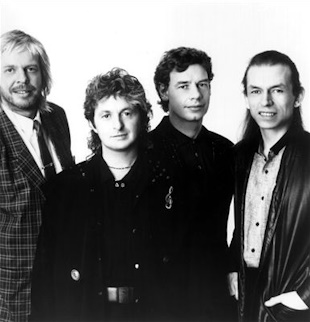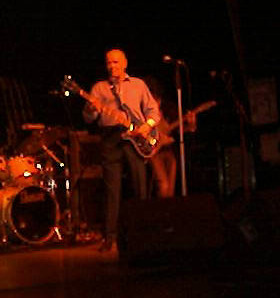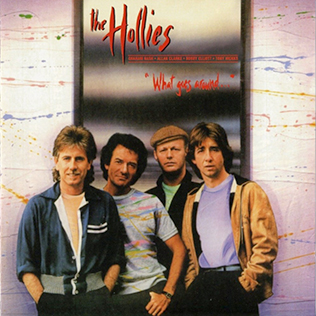
Yes are an English progressive rock band formed in London in 1968 by lead singer Jon Anderson, bassist Chris Squire, guitarist Peter Banks, keyboardist Tony Kaye, and drummer Bill Bruford. The band has undergone numerous lineup changes throughout their history, during which 20 musicians have been full-time members. Since February 2023, the band has consisted of guitarist Steve Howe, keyboardist Geoff Downes, bassist Billy Sherwood, singer Jon Davison, and drummer Jay Schellen. Yes have explored several musical styles over the years and are most notably regarded as progressive rock pioneers.

Jon Anderson is a British and American singer, songwriter and musician, best known as the former lead singer of the progressive rock band Yes, which he formed in 1968 with bassist Chris Squire. Renowned for his alto tenor range, he was a member of the band across three tenures until 2004, and was also the singer of the Yes-linked projects Anderson Bruford Wakeman Howe and Yes Featuring Jon Anderson, Trevor Rabin, Rick Wakeman. Anderson became an American citizen in 2009 with dual citizenship.

The Nice were an English progressive rock band active in the late 1960s. They blended rock, jazz and classical music.

William Scott Bruford is an English drummer and percussionist who first gained prominence as a founding member of the progressive rock band Yes. After leaving Yes in 1972, Bruford spent the rest of the 1970s recording and touring with King Crimson (1972–1974), Roy Harper (1975), and U.K. (1978), as well as touring with Genesis (1976). In 1978, he formed his own group, Bruford, which was active until 1980.

Anthony John Selvidge, known professionally as Tony Kaye, is an English keyboardist, best known as a founding member of the progressive rock band Yes. Born into a musical family, Kaye was classically trained and intended to become a concert pianist before he developed an interest in jazz and contemporary rock and pop music. He joined several groups throughout the 1960s, including the Federals, Johnny Taylor's Star Combo, Jimmy Winston & His Reflections, and Bittersweet.

Peter William Brockbanks, known professionally as Peter Banks, was a British guitarist. He was the original guitarist in the rock bands Yes, Flash, and Empire; he was also a guitarist for The Syn. Banks has been described as "the architect of progressive music".

The Yes Album is the third studio album by English progressive rock band Yes, released in the UK on 19 February 1971 and in the US on 19 March 1971 by Atlantic Records. It was the band's first album to feature guitarist Steve Howe, who replaced Peter Banks in 1970, as well as their last to feature keyboardist Tony Kaye until 1983's 90125.

Anderson Bruford Wakeman Howe (ABWH) were an English progressive rock band active from 1988 to 1990 that comprised four past members of the English progressive rock band Yes. Singer Jon Anderson left Yes as he felt increasingly constrained by their commercial and pop-oriented direction in the 1980s. He began an album with other members from the band's 1970s era: guitarist Steve Howe, keyboardist Rick Wakeman, and drummer Bill Bruford, plus bassist Tony Levin.

Talk is the fourteenth studio album by English progressive rock band Yes. It was released on 21 March 1994 by Victory Music, and is their last studio album to feature guitarist Trevor Rabin and keyboardist Tony Kaye.
Flaming Youth were a British rock band, active in the late 1960s. They were not commercially successful and are now remembered primarily as Phil Collins' first band that had a recording deal.
Jackson Heights were a British progressive rock band from England. It formed in 1970 after The Nice organist and pianist, Keith Emerson, decided to leave the trio to form another band, Emerson, Lake and Palmer, leaving bassist-vocalist Lee Jackson and drummer Brian Davison on their own.

Ronnie Caryl was an English guitarist who was a member of the band Flaming Youth. Over the years Caryl worked alongside Phil Collins, plus David Hentschel, Michel Polnareff, Lulu, Stephen Bishop, Eric Clapton, Gary Brooker, Maggie Bell and John Otway.

Keith Anthony Joseph "Lee" Jackson is an English bass guitarist known for his work in the Nice, a progressive-rock band, as well as his own band formed after the Nice, Jackson Heights, and finally Refugee with Nice drummer Brian Davison and Swiss keyboardist Patrick Moraz. Jackson plays bass left handed.
This is a timeline of artists, albums, and events in progressive rock and its subgenres. This article contains the timeline for the period 1970–1979.
This is a timeline of artists, albums, and events in progressive rock and its subgenres. This article contains the timeline for the period 1980 - 1989.
This is a timeline of artists, albums, and events in progressive rock and its subgenres. This article contains the timeline for the period 1990 - 1999.
The Warriors, also known as The Electric Warriors, were a British Beat group of the early 1960s. While the band recorded a few singles with Decca Records, it is mostly remembered because many of its members later became successful musicians in the British progressive rock scene of the 1970s.

Michael T. Franklin is an American musician and record producer.

What Goes Around... is the 21st studio album by English rock/pop group, the Hollies. It includes their version of The Supremes' "Stop! In the Name of Love", which became their last US hit single. The Hollies reunited with Graham Nash for this album and for the following US tour. The LP was the band's first and last album with Nash since Butterfly (1967) and also their last one with lead singer Allan Clarke. Among the guest musicians is Brian Chatton who was formerly keyboardist for The Warriors with Jon Anderson, and Flaming Youth with Phil Collins.












